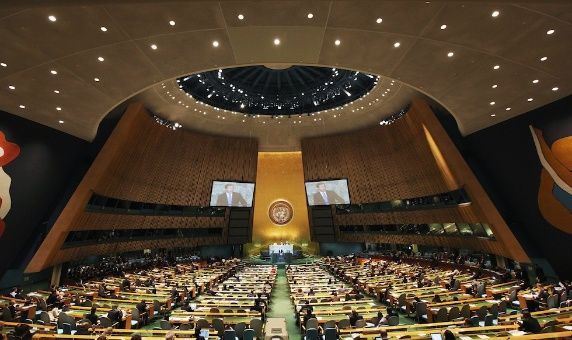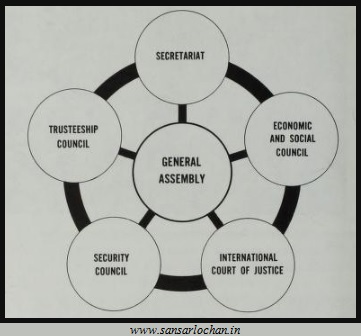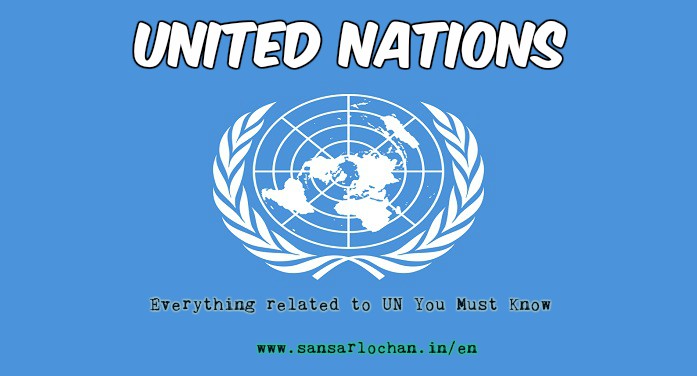Although, the United Nations is not a nation; neither a world government; nor it has citizens and collects no taxes; has no regular army, but it is nevertheless a great force to keep peace in the world. This is its most important function. It has stopped wars that were already being fought on the battlefield. The United Nations aims to raise the standard of living and to better the way of life for people in all parts of the world. This too, has helped to keep peace. The United Nations is known familiarly to most of us simply as the UN. The cost of the UN to all its member nations is very cheap. The share of each country is fixed according to its capacity to pay.
Headquarters
UN was established on 24 October 1945 after World War II. It is headquartered at Manhattan, New York City. Eighteen acres of land between First Avenue and the East River in Manhattan make up United Nations’ offices. This land was a gift to the United Nations by John D. Rockefeller, Jr. New York City gave some additional land and the waterfront rights on the East River. It also erected the United Nations Plaza. The land and buildings of the United Nations are international territory. This means that the United Nations makes its own laws for its territory. The United Nations has its own flag. It has its own guards, who police the area. It has its own radio service, which broadcasts in more than two dozens different languages. It has its own post office and issues its own postage stamps.
General Assembly of UN
If we were to visit a meeting of the General Assembly of the United Nations, this is what we could expect to see. More than one thousand men and women would be seated in curving rows in a large, dome-shaped hall. These people are delegates. They have been sent by their governments to represent them. They come from nearly every country of the world.

Many of the delegates would be seen wearing earphones attached to their seats. They would probably be sitting and listening to a speech made by a fellow delegate in a language which might be unintelligible to them because the United Nations works in five different languages. Then how can they all understand the delegate who is speaking? This is made possible by means of the earphones, a six-position switch control, and a special group of translators.
Official Languages
The UN has five official languages. These are Chinese, French, Russian, Spanish and English. If a delegate speaks in any one of these five languages, the translators immediately interpret the speech into the other four languages. The speeches go into their ears in one language and come out of their mouths in another.
Why was United Nations Established?
At the end of World War I, the community of nations experienced the need to establish an international body to prevent war between nations the world over. For this purpose, the League of Nations was formed in 1920. But this institution failed to live up to the task allotted to it, and, as we are all aware, the World War II broke out in 1939.
World War II was so destructive that the leaders of the Allied Powers felt that some permanent and workable way had to be found to keep peace among nations. In 1945 fifty countries sent delegates to a meeting at San Francisco, where the United Nations was founded. It was organized to handle quarrels between nations that might lead to war.
The Charter
The member countries of the UN are bound together by their Charter, or constitution. The UN Charter is one of the great documents of history. It has been called an international Bill of Rights. The UN Charter came into force on October 24, 1945. This day has since become known as UN Day.
The Charter prescribes rules for the member nations to follow. It states the purpose of the UN and defines what the UN can and cannot do.
Objectives or Purposes
These are the four main objectives or purposes of the UN:
- To keep peace throughout the world.
- To develop friendly relations among nations, based on equal rights for each nation and the right of each nation to govern itself.
- To help improve the living conditions of people all over the world and to promote human rights and freedom for all people.
- To provide a place where nations may meet together and try to solve their mutual problems.
UN Membership
The membership list is growing all the time. From the original 51 members, the number of UN members has grown to 193. No nation has to join the UN if it does not want to.
Organs

If every nation lived up to the purposes set down by the UN, the world would be a wonderful place to live in. However nations, like people, do not always live up to their ideals. There are many committees, commissions, and councils in the UN to help carry out its purposes. The Charter itself names only six principal organs:
- The General Assembly
- The Security Council
- The Economic and Social Council
- The Trusteeship Council
- The International Court of Justice
- The Secretariat
These six organs help to achieve the main purposes of the UN.
Importance of UN
The United Nations helps keep peace, improve living standards and human welfare, promote the independence of nations and improve relations between them.
In the last six plus decades of its existence, the United Nations has clearly shown how important it is. Peace has been preserved when it looked as if war could not be avoided. UN helps to restore peace in conflicts in different regions of the world. The Suez Canal crisis in 1956 is a brilliant example. In 1958 the UN helped Lebanon, Jordan and neighbouring countries in the Middle East to sit down and settle their differences peacefully instead of by fighting. Its action in the Congo in 1960 helped keep peace and order there and probably saved Africa from war. The debates in the Security Council and action by the Secretary-General helped to avert the danger of a possible nuclear war in the Cuban crisis in 1962. The Security Council dispatched a peace-keeping force to Cyprus and observers to Kashmir to stop the fighting there.
Important Role
Nobody can say for sure that any of these situations mentioned above would have caused a big war if it had continued. But war certainly could have resulted if the UN had not used its powerful pressures for peace. The list of UN interventions is very long one. Even in recent years, the UN has had a pivotal role in dousing the fireworks of possible wars through the length and width of the globe.
The UN Charter is itself one of the great milestones of history. It prescribes rules for peaceful relations between nations. In the UN Charter, the threat or use of force is outlawed, except in self-defence or when ordered by the Security Council.
